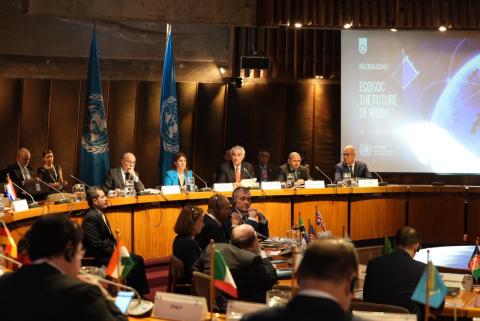Press Release
Government officials, scholars and international experts explored new forms of cooperation between the Republic of Korea and the countries of Latin America and the Caribbean in an academic seminar held on Monday, April 11, at the headquarters of the Economic Commission for Latin America and the Caribbean (ECLAC) in Santiago, Chile.
“We admire the Republic of Korea’s successful experience in economic development, which offers important lessons for our region and for the developing world in general,” Alicia Bárcena, ECLAC’s Executive Secretary, said during the inauguration of the event entitled Exploring strategies for economic cooperation between Korea-Latin America and the Caribbean.
Other participants in the opening session were: Ji-eun Yu, the Ambassador of the Republic of Korea to Chile; and César Dargam, Deputy Foreign Affairs Minister of the Dominican Republican, which holds the Pro Tempore Chair of the Community of Latin American and Caribbean States (CELAC).
“The government of the Republic of Korea has made the greatest of efforts to promote friendly and cooperative relationships with the countries of Latin America and the Caribbean,” said Ji-eun Yu, who recalled that the holding of this seminar was agreed upon in September of last year in New York, at the fourth meeting of foreign ministers of the Asian country and of the Quartet of CELAC.
The ambassador also highlighted the constant collaboration carried out with ECLAC since his country joined the Member States of this United Nations regional commission in 2007.
Meanwhile, César Dargam said that “the Republic of Korea, as an extraregional partner, has many contributions to make, not just from the point of view of direct cooperation but also in terms of exchanging experiences and analyzing how we can confront this complex (economic) scenario that we see ahead.”
“CELAC puts people at the center of its agenda and, therefore, addressing a multidimensional agenda seeks to have an impact on our citizens’ direct development. Korea emerges, then, as an important reference point in the design and redesign of this agenda,” the Dominican Deputy Foreign Affairs Minister stated.
During her talk, Bárcena examined the development process of the Republic of Korea in the last six decades, during which time it went from being one of the world’s poorest countries to transforming itself “into a high-income economy; an industrial, export and scientific power; and a society with high levels of social cohesion and educational achievement.”
The Asian nation has taught us that “the convergence of a low-income country with more developed economies is indeed possible,” said the senior official, and that it is likewise feasible to “insert oneself in the fourth industrial revolution that is under way, which aims to take advantage of technological advances to build paths that are low in carbon.”
The trade ties between the Republic of Korea and the region have strengthened in the last decade but still remain at modest levels, Bárcena warned. The Asian country’s participation in regional exports was around 1.3% in 2013 (and 3.1% in imports). Meanwhile, the region’s participation in Korean exports is around 6% (and 3.5% in imports).
“It is very symbolic that this seminar is being held less than 10 days after the Meeting of CELAC’s Foreign Affairs Ministers took place in the Dominican Republic. The relationship with extraregional partners is one of the priorities of CELAC’s agenda, and ECLAC plays a technical role in this, as in the case of organizing this meeting,” Bárcena indicated.
During the gathering, participants analyzed issues such as innovation and labor skills development policies (both Korean and Latin American), and the policies to internationalize Small and Medium Enterprises (SMEs) in the Republic of Korea and the region.



